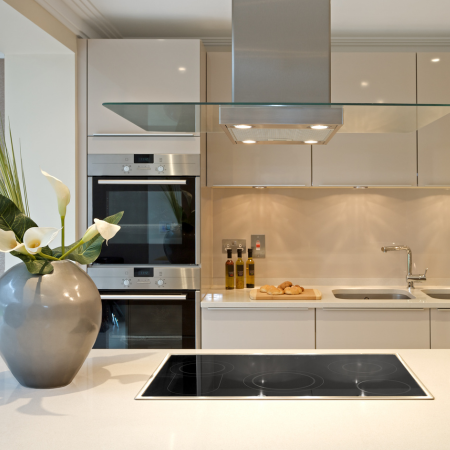Embarking on a kitchen remodel is an exciting venture that can significantly enhance your home’s functionality, aesthetics, and overall value. However, it can also be a complex and daunting task, requiring careful planning and consideration. Whether you're giving your kitchen a facelift or designing a new one from scratch, here are some essential things to consider before starting your project.
1. Establish Your Budget
Before you dive into your kitchen project, set a realistic budget. Determine how much you're willing to spend and build in a contingency for unexpected costs, typically around 10-20% of the total budget. Remember that a kitchen remodel involves various costs, including materials, labour, appliances, permits, and unforeseen expenses. Knowing your budget will help guide your choices and prevent overspending.
Tips:
· Prioritize the aspects of your kitchen that matter most to you, whether it’s high-end appliances, custom cabinetry, or premium countertops.
· Research the cost of materials and labour in your area to develop a more accurate estimate.
· Decide early if you plan to DIY some elements to save money, and assess your skills realistically to avoid costly mistakes.
2. Consider the Kitchen Layout and Workflow
The kitchen is the heart of the home, and its layout should maximize efficiency and functionality. Consider the "kitchen work triangle," which is the ideal distance between the stove, sink, and refrigerator. This concept ensures that movement between these three key areas is smooth and efficient.
Tips:
· Ensure there is adequate counter space near your main work areas.
· Consider how you move through the kitchen while cooking. The layout should complement your cooking style and daily routines.
· Don't forget about traffic flow: Ensure there is enough space for multiple people to move around comfortably.
3. Choose the Right Materials
From cabinets to countertops, flooring, and backsplash, the materials you choose will define the look and feel of your kitchen. Think about the durability, maintenance, and aesthetic appeal of each material.
Tips:
· Choose materials that are durable and easy to clean, especially if you have a busy household or young children.
· Consider environmentally friendly options like bamboo flooring, recycled glass countertops, or energy-efficient appliances.
· Don’t forget about the little things—hardware, faucets, and light fixtures can make a big difference in the overall aesthetic.
4. Lighting Is Key
Good lighting can make or break a kitchen's functionality and atmosphere. A well-lit kitchen requires a combination of task lighting, ambient lighting, and accent lighting.
Tips:
· Install task lighting under cabinets to illuminate work surfaces.
· Use pendant lights over islands or dining areas for both functional and decorative purposes.
· Consider dimmable lights to control the ambiance and adjust lighting according to different needs and times of day.



5. Storage Solutions Are Essential
A well-organized kitchen with ample storage is key to maintaining a clutter-free and functional space. Think about your current storage needs and plan for the future.
Tips:
· Optimize cabinet storage with pull-out shelves, lazy Susans, and dividers.
· Use vertical space by extending cabinets to the ceiling.
· Consider adding a pantry or built-in storage for bulk items and kitchen appliances.
6. Think About Appliances and Technology
Appliances are the workhorses of the kitchen, and their placement and functionality are crucial. Consider the size, style, and energy efficiency of each appliance.
Tips:
· Choose energy-efficient appliances to save on utility bills and reduce your environmental footprint.
· Think about smart kitchen technologies like touchless faucets, smart ovens, or voice-activated lighting.
· Ensure appliances are in convenient locations and have enough clearance for doors to open fully.
7. Plan for the Future
Your kitchen remodel should serve your needs for years to come. Consider how your needs might change over time, whether due to a growing family, aging in place, or potential resale value.
Tips:
· Choose timeless designs that will age well, avoiding overly trendy choices that may date quickly.
· Consider accessibility features, like wider doorways, lower counters, or easy-to-reach storage, especially if you plan to stay in your home long-term.
· Think about the resale value. Kitchens are a significant selling point for homes, so make choices that will appeal to future buyers.
8. Don’t Forget Ventilation
Proper ventilation is essential to prevent odours, smoke, and grease buildup in your kitchen. A good range hood or exhaust fan is critical, especially if you cook frequently.
Tips:
· Choose a range hood that is powerful enough for your stove’s output and that vents to the outside.
· Consider a downdraft system if a traditional hood is not an option.
· Ensure windows can be opened easily for additional ventilation.
9. Work with Professionals
Even if you’re a seasoned DIYer, consider hiring professionals for certain aspects of the remodel, like plumbing, electrical work, and custom cabinetry. Their expertise can save you time, stress, and money in the long run.
Tips:
· Research and hire a reputable contractor with good reviews and experience in kitchen remodels.
· Get multiple quotes and be clear about your expectations and budget.
· Consider working with a kitchen designer who can help you optimize your space and avoid common pitfalls.
10. Timing and Project Management
A kitchen remodel can be a lengthy process, so plan accordingly. Consider how long you’re willing to live without a fully functional kitchen and create a realistic timeline.
Tips:
· Set a project schedule and account for potential delays.
· Plan alternative arrangements for meals, like setting up a temporary kitchen or eating out.
· Communicate regularly with your contractor to stay updated on progress and address issues as they arise.
A kitchen remodel is a major undertaking, but with careful planning and consideration of the elements above, you can create a space that is not only beautiful but also highly functional. Take your time to think through each aspect of the project, prioritise your needs, and don’t be afraid to consult with professionals. A well-thought-out kitchen can provide years of enjoyment and increase your home's value, making it a worthwhile investment.
By considering these factors before you begin, you'll be better equipped to handle the complexities of a kitchen remodel and more likely to achieve the kitchen of your dreams.
Our kitchen designers are on hand to help you every step of the way! Get in touch now for your desing appointment.
